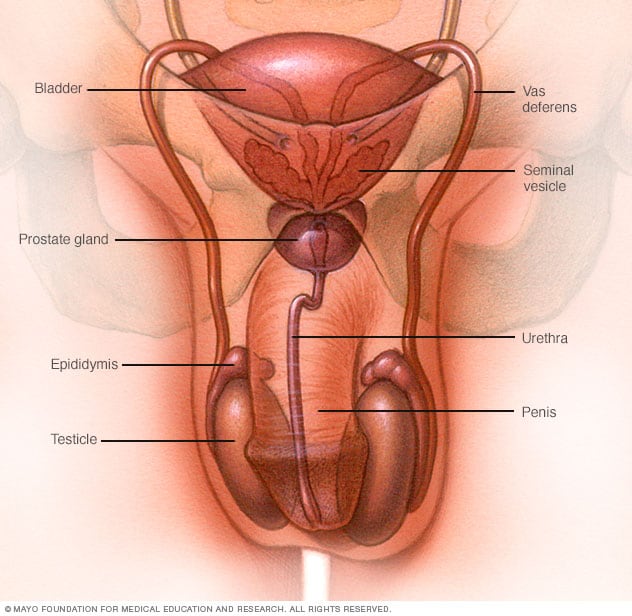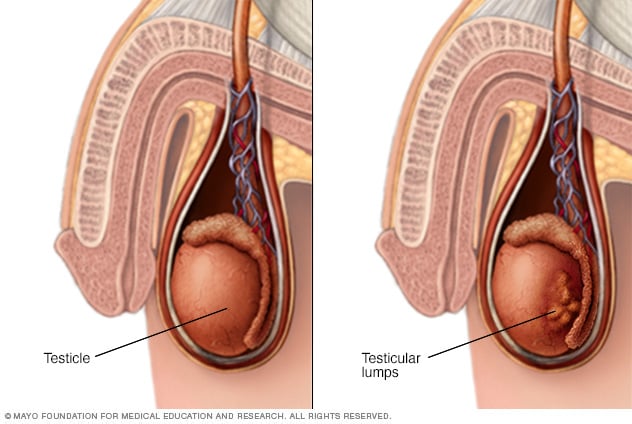Overview
Male reproductive system

Male reproductive system
The male generative system makes, stores and moves sperm. Testicles produce sperm. fluid from the seminal vesicles and prostate gland gland compound with sperm to make semen. The penis ejaculates semen during sexual intercourse .
testicular cancer occurs in the testicles ( testes ), which are located inside the scrotum, a informal pocket of skin underneath the penis. The testicles produce male sexual activity hormones and sperm for replica .
Compared with other types of cancer, testicular cancer is rare. But testicular cancer is the most common cancer in american males between the ages of 15 and 35.
testicular cancer is highly treatable, even when cancer has spread beyond the testis. Depending on the type and phase of testicular cancer, you may receive one of several treatments, or a combination .
Symptoms
Testicular lumps

Testicular lumps
pain, swelling or lumps in your testis or groin area may be a sign or symptom of testicular cancer or other checkup conditions requiring treatment .
Signs and symptoms of testicular cancer include :
- A lump or enlargement in either testicle
- A feeling of heaviness in the scrotum
- A dull ache in the abdomen or groin
- A sudden collection of fluid in the scrotum
- Pain or discomfort in a testicle or the scrotum
- Enlargement or tenderness of the breasts
- Back pain
Cancer normally affects only one testis .
When to see a doctor
See your repair if you detect any trouble, swelling or lumps in your testicles or groin area, particularly if these signs and symptoms last longer than two weeks .
There is a problem with information submitted for this request. Review/update the data highlighted below and resubmit the form .
Get Mayo Clinic cancer expertise delivered to your inbox.
Subscribe for free and receive an in-depth guide to coping with cancer, plus helpful information on how to get a second impression. You can unsubscribe at any time .
I would like to learn more about
Up-to-date cancer news & research
Mayo Clinic cancer care & management
options
Error Select a topic
Email address
ErrorEmail airfield is required
ErrorInclude a valid e-mail address
First Name (let us know your preferred name)
Last Name
To provide you with the most relevant and helpful information, and understand which information is beneficial, we may combine your electronic mail and web site custom data with early information we have about you. If you are a Mayo Clinic affected role, this could include protected health information. If we combine this data with your protected health information, we will treat all of that information as protected health information and will entirely use or disclose that information as set forth in our notification of privacy practices. You may opt-out of electronic mail communications at any meter by clicking on the unsubscribe connection in the electronic mail .
Thank you for subscribing
Your in-depth hook with cancer guide will be in your inbox concisely. You will besides receive emails from Mayo Clinic on the latest about cancer newsworthiness, research, and care .
If you don ’ thyroxine receive our e-mail within 5 minutes, check your SPAM folder, then contact us at newsletters @ mayoclinic.com .
Sorry something went wrong with your subscription
Please, hear again in a match of minutes
Causes
It ‘s not clear what causes testicular cancer in most cases .
Doctors know that testicular cancer occurs when healthy cells in a testis become altered. Healthy cells grow and divide in an orderly direction to keep your body functioning normally. But sometimes some cells develop abnormalities, causing this growth to get out of control — these cancer cells continue dividing even when new cells are n’t needed. The accumulating cells form a mass in the testis .
closely all testicular cancers begin in the source cells — the cells in the testicles that produce young sperm. What causes source cells to become abnormal and develop into cancer is n’t known .
Risk factors
Factors that may increase your risk of testicular cancer include :
- An undescended testicle (cryptorchidism). The testes form in the abdominal area during fetal development and normally descend into the scrotum before birth. man who have a testis that never descended are at greater risk of testicular cancer than are men whose testicles descended normally. The hazard remains elevated even if the testis has been surgically relocated to the scrotum .
still, the majority of men who develop testicular cancer do n’t have a history of undescended testicles . - Abnormal testicle development. Conditions that cause testicles to develop abnormally, such as Klinefelter syndrome, may increase your risk of testicular cancer.
- Family history. If family members have had testicular cancer, you may have an increased risk.
- Age. Testicular cancer affects teens and younger men, particularly those between ages 15 and 35. However, it can occur at any age.
- Race. Testicular cancer is more common in white men than in black men.
Prevention
There ‘s no way to prevent testicular cancer.
Read more: Kyoto Sanga FC
Some doctors recommend regular testis self-examinations to identify testicular cancer at its earliest degree. But not all doctors agree. Discuss testicular introspection with your doctor if you ‘re diffident about whether it ‘s right for you .
